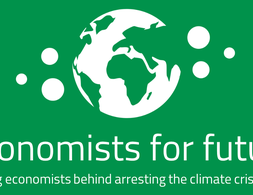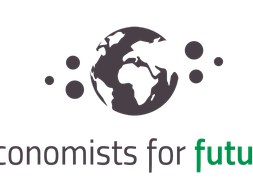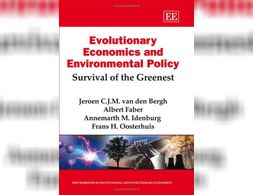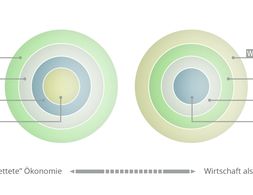676 Ergebnisse
‘We cannot afford their peace & We cannot bear their wars’:
Value, Exploitation, Profitability Crises & ‘Rectification’
Commons stand for a plurality of practices ‘beyond market and state’ as the famous Commons scholar – and first female noble prize winner of economics - Elinor Ostrom put it. Their practice and theory challenge classical economic theory and stand for a different mode of caring, producing and governing. Within this workshop we want to dive into theory, practice and utopia of Commons following four blocks...
In a span of around 12 weeks, the course covers a wide range of topics including agent-based modeling, networks, dynamic, chaos, information, fractals, cooperation models and scaling in biology and society. The course acts as a perfect beginner level introduction spanning a wide range of topics in the field of complexity.
More Heat Than Light is a history of how physics has drawn some inspiration from economics and also how economics has sought to emulate physics, especially with regard to the theory of value. It traces the development of the energy concept in Western physics and its subsequent effect upon the invention and promulgation of neoclassical economics.
How can we establish new institutions and practices in order to use fare-free public transport as a beacon for sustainable mobility and a low-carbon lifestyle? The author of this essay elaborates on how practice theory and institutional economics can help to answer this question.
Stratification economics is defined as a systemic and empirically grounded approach to addressing intergroup inequality. Stratification economics integrates economics, sociology and social psychology to distinctively analyze inequality across groups that are socially differentiated, be it by race, ethnicity, gender, caste, sexuality, religion or any other social differentiation.
Towards a post-work future: a necessary agenda to reconcile feminist & ecological concerns with work
In this essay the author outlines the basis for embracing a post-work agenda, rooted in an emancipatory potential from the domination of waged work, which could help answer both feminist and ecological concerns with work.
It is perhaps fitting that the seriousness of the coronavirus threat hit most of the Western world around the Ides of March, the traditional day of reckoning of outstanding debts in Ancient Rome. After all, problems and imbalances have accumulated in the Western capitalist system over four decades, ostensibly since it took the neoliberal road out of the 1970s crisis and kept going along it, heedless of the crises and problems it led to.
Firms are the primary places where economic activity takes place in modern capitalist economies: they are where most stuff is produced; where many of us spend 40 hours a week; and where big decisions are made about how to allocate resources. Establishing how they work is hugely important because it helps us to understand patterns of production and consumption, including how firms will react to changes in economic conditions and policy. And a well-established literature – led by post-Keynesians and institutionalists – holds that the best way to determine how firms work is to…wait for it...ask firms how they work. This a clearly sensible proposition that is contested in economics for some reason, but we’ll ignore the controversy here and just explore the theory that springs from this approach.
If there’s one method economists have neglected the most, it’s qualitative research. Whereas economists favour mathematical models and statistics, qualitative research seeks to understand the world through intensive investigation of particular circumstances, which usually entails interviewing people directly about their experiences. While this may sound simple to quantitative types the style, purpose, context, and interpretation of an interview can vary widely. Because of this variety, I have written a longer post than usual on this topic rather than doing it a disservice. Having said that, examples of qualitative research in economics are sadly scant enough that it doesn’t warrant multiple posts. In this post I will introduce qualitative research in general with nods to several applications including the study of firm behaviour, race, Austrian economics, and health economics. More than usual I will utilise block quotes, which I feel is in the spirit of the topic.
Der Fokus der Neoklassik liegt auf dem Umgang mit knappen Ressourcen. Analysen beschäftigen sich mit der effizienten Allokation von Ressourcen, um den Wohlstand zu vermehren.
This text provides an easy to understand introduction to complexity economics for non-specialist audiences such as bachelor's students.
In this essay, the principle of capital accumulation, as well as the idea of homo economicus as the basis of the growth model, are located and analyzed from a feminist perspective. The sufficiency approach is presented as an alternative to these two economic logics.
Diese Webseite widmet sich der Vielfalt bestehender ökonomischer Theorien und Methoden. Orientiere Dich, vergleiche, entdecke und studiere die unterschiedlichen ökonomischen Perspektiven.
Eine kritische Bestandsaufnahme des Standartlehrbuches „Grundzüge der Mikroökonomie“
Was lässt sich basierend auf bereits existierenden Studien über den Status Quo der volkswirtschaftlichen Lehre aussagen?
Die Disziplin der Wirtschaftswissenschaften nutzt im Bereich der Verhaltensökonomik häufig experimentelle Spiele, um das menschliche Verhalten zu untersuchen, wie z.B. das Diktatorspiel. Mithilfe postkolonialer Analysemethoden untersucht dieser Essay am Beispiel eines bekannten Aufsatzes der Verhaltensökonomik von Henrich et al. 2001 zu indigenen Gemeinschaften, wie Wissen über menschliches Verhalten in wirtschaftlichen Kontexten konstruiert und kategorisiert wird.
Brauchen wir angesichts der sich zuspitzenden Klimaproblematik neue ökonomische Denkweisen – jenseits der ‚unsichtbaren Hand des Marktes’ und des ‚rationalen’ Agenten – und wie sollten diese aussehen?
Um der Klimakrise zu begegnen, müssen wir unsere Art zu wirtschaften radikal verändern. Ein großes Hindernis auf diesem Weg könnte die vorherrschende ökonomische Theorie sein. Denn der neoklassischen Wirtschaftswissenschaft ist es methodisch unmöglich, alternative Wirtschaftsformen abzubilden. Außerdem führt sie zu Politikempfehlungen, die systematisch die Möglichkeit einer Postwachstumswirtschaft ausblenden.
One method of economic modelling that has become increasingly popular in academia, government and the private sector is Agent Based Models, or ABM. These simulate the actions and interactions of thousands or even millions of people to try to understand the economy – for this reason ABM was once described to me as being “like Sim City without the graphics”. One advantage of ABM is that it is flexible, since you can choose how many agents there are (an agent just means some kind of 'economic decision maker' like a firm, consumer, worker or government); how they behave (do they use complicated or simple rules to make decisions?); as well as the environment they act in, then just run the simulation and see what happens as they interact over time.
For many social critics "globalization" is a signpost of “late-capitalism” with the rise of multinational corporations, mass consumption and the multidirectional flows of capital, labor, media, communication, ideologies and social movements across national borders. Feminist analyses of globalization and the gendered and sexualized permutations of these phenomena offer a critical stance for theorizing these processes, and for studying their complex articulations across time and space.
This course attempts to explain the role and the importance of the financial system in the global economy. Rather than separating off the financial world from the rest of the economy, financial equilibrium is studied as an extension of economic equilibrium. The course also gives a picture of the kind of thinking and analysis done by hedge funds.
This study offers a unique evolutionary economics perspective on energy and innovation policies in the wider context of the transition to sustainable development. The authors include: - an analysis of the environmental policy implications of evolutionary economics - a critical examination of current Dutch environmental and innovation policies and policy documents - systematic evaluation of three specific energy technologies, namely fuel cells, nuclear fusion and photovoltaic cells, within the evolutionary-economic framework.
This Companion takes stock of the trajectory, achievements, shortcomings and prospects of Marxist political economy. It reflects the contributors' shared commitment to bringing the methods, theories and concepts of Marx himself to bear across a wide range of topics and perspectives, and it provides a testimony to the continuing purpose and vitality of Marxist political economy.
On July 2020 ZOE-Institute published a unique platform for transformative policymaking: Sustainable Prosperity. Building on insights from new economic thinking the platform provides knowledge about ideas, arguments and procedures that support effective promotion of political change. It aims to strengthen change makers in public policy institutions, who are working on an ambitious green and just transition. As such, it provides convincing arguments and policy ideas to overcome the reliance of economic policy on GDP growth
That’s why it is time, says renegade economist Kate Raworth, to revise our economic thinking for the 21st century. In Doughnut Economics, she sets out seven key ways to fundamentally reframe our understanding of what economics is and does.
Thinking in Systems, is a concise and crucial book offering insight for problem solving on scales ranging from the personal to the global. Edited by the Sustainability Institute's Diana Wright, this essential primer brings systems thinking out of the realm of computers and equations and into the tangible world, showing readers how to develop the systems-thinking skills that thought leaders across the globe consider critical for 21st-century life.
Overview page for the collection of nobel laureateas on Exploring Economics
This guide contains a collection of recommended YouTube channels and YouTube videos in the fields of economics, business and economic policy.
Die dominante Ökonomie fordert eine Bepreisung der Umwelt – spielt aber de facto beim Klimaschutz eine bremsende Rolle. Ihre Vorstellungen von „dem Markt“ sind zur direkten Bedrohung der Menschheit geworden.
Der Fokus der Ökologischen Ökonomik ergibt sich aus der Einsicht, dass wirtschaftliche Aktivität mit absoluten Grenzen konfrontiert ist. Somit werden Wechselwirkungen zwischen Wirtschaft, Gesellschaft und natürlicher Umwelt analysiert, mit dem Ziel einer Transformation hin zu (mehr) Nachhaltigkeit.
Eine erfolgreiche Wirtschaftstransformation hängt von einer Veränderung der ökonomischen Praktiken der Akteure ab. Die „Spirale transformativen Lernens“ identifiziert, welche Fähigkeiten dafür entscheidend sind.
Wir nutzen Cookies. Klicke auf "Akzeptieren" um uns dabei zu helfen, Exploring Economics immer besser zu machen!






























